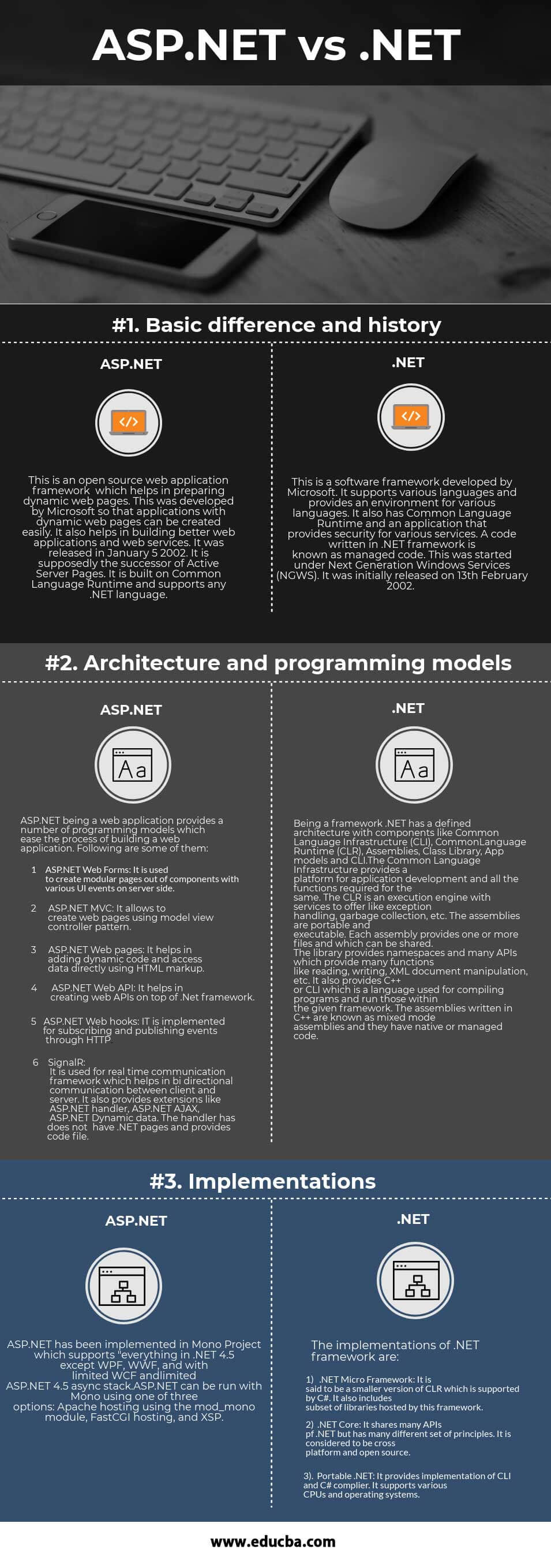Updated April 10, 2023
Difference Between ASP.NET vs .NET
It is mostly misunderstood that ASP.NET vs .NET are the same. When a programmer working on these will definitely know that they are not the same. .NET is a software framework or infrastructure which Microsoft developed. ASP.NET, on the other hand, is a web application that is used to build various applications. This is the basic difference between ASP.NET vs .NET. To know more about the difference between ASP.NET vs .NET, let us see the below points.
Head to Head Comparison Between ASP.NET and .NET (Infographics)
Below is the top 3 difference between ASP.NET and .NET:
Key Differences Between ASP.NET and .NET
Both Raspberry ASP.NET vs .NET are popular choices in the market; let us discuss some of the major Difference Between ASP.NET vs .NET:
- .NET is a framework or an infrastructure on which various applications can be built. ASP.NET can be said as an application that is built on the .NET framework. ASP.NET is an application which is used to create dynamic web pages.
- .NET supports both console and web applications. An important component of .NET is Common Language Runtime which provides a neutral platform for handling various tasks like memory management, exception handling, debugging, code safety and compilation. ASP.NET provides controlled architecture and a server-side binding model. It can also be called a collection of .NET classes that help process HTTP requests and generate the corresponding responses. ASP.NET being built upon .NET can use any language.
- The libraries of .NET contain various reusable classes, interfaces, etc. The common type system can be used to declare, use and manage different types of data, classes, functions, etc., through this framework. This framework also supports cross-language integration, which supports multiple languages to be used. All source code used is used to first convert to an intermediate language, and this intermediate language is converted to machine language. On the other hand, when an instance of any page is created, then the PreInit event occurs, and it invokes the method Page_PreInit. This sets the theme of the page and brings uniformity. The next event that occurs is the Init event which will initialize the objects present on the page. Once this is done, the Load event is invoked, and the page_load event handler is executed. The Init event is called the first time when a page is requested to be loaded. Whenever a request is made, then a page is loaded and once the response is received, then unload event occurs.
ASP.NET and .NET Comparison Table
The primary comparison between ASP.NET and .NET are discussed below:
| The Basis Of Comparison Between ASP.NET vs .NET | ASP.NET | .NET |
| Basic Difference and History | This is an open-source web application framework that helps in preparing dynamic web pages. This was developed by Microsoft so that applications with dynamic web pages can be created easily. It also helps in building better web applications and web services. It was released on January 5, 2002. It is supposedly the successor of Active Server Pages. It is built on Common Language Runtime and supports any .NET language. | This is a software framework developed by Microsoft. It supports various languages and provides an environment for various languages. It also has Common Language Runtime and an application that provides security for various services. A code written in a .NET framework is known as managed code. This was started under Next Generation Windows Services (NGWS). It was initially released on 13th February 2002. |
| Architecture and Programming Models | ASP.NET being a web application, provides a number of programming models that ease the process of building a web application. Following are some of them: 1) ASP.NET Web Forms: It is used to create modular pages out of components with various UI events on the server-side. 2) ASP.NET MVC: It allows to create of web pages using a model view controller pattern. 3) ASP.NET Web pages: It helps in adding dynamic code and access data directly using HTML markup. 4) ASP.NET Web API: It helps in creating web APIs on top of.Net framework. 5) ASP.NET Webhooks: IT is implemented for subscribing and publishing events through HTTP. 6) SignalR: It is used for a real-time communication framework that helps in bi-directional communication between client and server. It also provides extensions like ASP.NET handler, ASP.NET AJAX, ASP.NET Dynamic data. The handler has does not have .NET pages and provides code file. |
Being a framework, .NET has a defined architecture with components like Common Language Infrastructure (CLI), Common Language Runtime (CLR), Assemblies, Class Library, App models and CLI. The Common Language Infrastructure provides a platform for application development and all the functions required for the same. The CLR is an execution engine with services to offer like exception handling, garbage collection, etc. The assemblies are portable and executable. Each assembly provides one or more files and which can be shared. The library provides namespaces and many APIs, which provide many functions like reading, writing, XML document manipulation, etc. It also provides C++ or CLI, which is a language used for compiling programs and run those within the given framework. The assemblies written in C++ are known as mixed-mode assemblies, and they have a native or managed code. |
| Implementations | ASP.NET has been implemented in the Mono Project, which supports “everything in .NET 4.5 except WPF, WWF, and with limited WCF and limited ASP.NET 4.5 async stack. ASP.NET can be run with Mono using one of three options: Apache hosting using the mod_mono module, FastCGI hosting, and XSP. |
The implementations of a .NET framework are: 1) .NET Micro Framework: It is said to be a smaller version of CLR, which is supported by C#. It also includes a subset of libraries hosted by this framework. 2) .NET Core: It shares many APIs pf .NET but has many different sets of principles. It is considered to be a cross-platform and open source. 3) Portable .NET: It provides an implementation of CLI and C# compiler. It supports various CPUs and operating systems. |
Conclusion
To conclude, .NET is a framework that provides a base for all different applications to run. ASP.NET, on the other hand, is used to build applications of the .NET framework. ASP.NET is a language that can be used with .NET hence making the creation of web applications. .NET being a framework provides consistency while developing applications, provides a complete infrastructure, software development is minimized, and the code under execution remains safe. As a result, ASP.NET vs .NET is supposed to go be going hand in hand for a proper application to be built.
Recommended Articles
This has been a guide to the top differences between ASP.NET vs .NET. Here we also discuss the ASP.NET vs .NET head to head comparison, key differences, along with infographics and a comparison table. You may also have a look at the following ASP.NET vs .NET articles to learn more –



